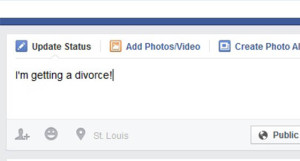 Is there a link between social media use and higher divorce rates? More and more research is suggesting that the two are related in at least some capacity.
Is there a link between social media use and higher divorce rates? More and more research is suggesting that the two are related in at least some capacity.
Last year, a study published in the journal Computers in Human Behavior compared divorce rates for each state to per capita Facebook accounts. A separate analysis looked at data from a 2011-12 survey asking people about their marriage quality and social media use.
The study discovered a link between social media use and a decrease in marriage quality.
The state analyses found a 20 percent annual increase in Facebook enrollment was associated with a 2.18 percent to 4.32 percent increase in divorce rates. The individual survey results predicted that someone who doesn’t use social media is more than 11 percent happier in marriage than a heavy social media user.
However, these results don’t necessarily mean social media use itself is to blame for marriages failing. There could be extraneous variables involved.
For example, a disgruntled husband might log on to Twitter or Facebook more often to divert his mind from the arguments he has been having with his wife.
However, it is apparent that social media’s influence in marriages, and divorce, is becoming more prevalent.
A recent survey of nearly 2,000 married individuals in the Great Britain conducted by family law specialists Slater and Gordon discovered that just under half of all Brits admit to secretly checking their partner’s Facebook account. One in five then went on to have an argument about what they discovered and one in seven contemplated divorcing because of the other’s activities.
Nearly a quarter of individuals surveyed said social media led to at least one argument a week and 17 percent said they fought every day because of it.
Social media’s role also continues to grow in divorce proceedings. We’ve seen divorce selfies, and we’ve even seen divorce papers served via Facebook. And social media is now frequently being used as evidence in divorce and custody cases.
In 2010, 81 percent of divorce attorneys surveyed by the American Academy of Matrimonial Lawyers said they’ve seen an increase in the number of cases using social networking as evidence during the past five years.
There are no laws governing Facebook or social media usage in divorce proceedings, but Cordell & Cordell Regional Partner Bryan Abercrombie says he first noticed Facebook timelines being used as evidence around 2010 or 2011.
“In almost every case nowadays we ask for discovery about Facebook timelines,” Mr. Abercrombie said. “Just about every attorney does because there’s just so much information on social media.”
With that being the case, it is crucial to be diligent in monitoring your social media activity for the duration of your case. Most attorneys recommend suspending all activity until a settlement has been reached.
“You can generally presume that anything you post online, any text that you send or any email that you send to your spouse or to the other parent could be used as evidence against you at a hearing later on down the road,” said Cordell & Cordell family law attorney Kimberly McCabe.

